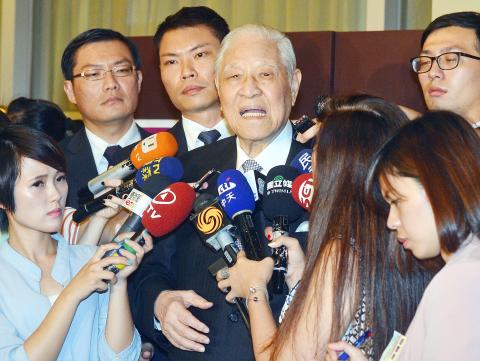Former president Lee Teng-hui (李登輝) yesterday said the Chinese Nationalist Party’s (KMT) vituperative attacks on him over an interview he gave to a Japanese magazine were baseless and were an attempt to win votes.
Over the past few days, President Ma Ying-jeou (馬英九), KMT presidential candidate Hung Hsiu-chu (洪秀柱) and other KMT and pan-blue politicians have criticized Lee over remarks he made during an interview with the Japanese magazine Voice, when he said that Taiwan did not fight a war of resistance against Japan during the Japanese colonial era, and that many Taiwanese joined the Japanese Imperial Army at that time to fight for their motherland, which they thought of as Imperial Japan.
“Politicians should always tell people the truth,” Lee said, before he walked into a fund-raising dinner for the Lee Teng-hui Foundation in Taipei, in response to media requests for comment on the KMT’s accusations.

Photo: Wang Yi-sung, Taipei Times
“There was no ‘War of Resistance Against Japan’ in Taiwan, because at that time, Taiwan belonged to Japan, so there was no such thing, you can ask anyone who is over 70 years old in Taiwan about it.”
“The KMT was fighting the war of resistance against Japan in China, and tried to relate it to Taiwan, but it is just not something that happened in Taiwan,” he said.
Lee said he was born in 1923, during the Japanese colonial era, and also served in the Japanese Imperial Army, as did between 100,000 and 200,000 other Taiwanese men, “and we were in the military to fight for Japan.”
He then attacked the KMT for what he said was an intentional attempt to confuse the public to win votes.
“Because they are not confident about the elections, they are making things up to try and humiliate me, and saying that I am too old to think clearly. Well, I am old, but I can still think very clearly,” he said.
Asked to respond to Ma’s call for him to apologize for his remarks, Lee said it is nonsense that someone who tells the truth should apologize, adding that Ma should focus his energy on coming up with policy ideas that might benefit the nation.
“He should compare how well things were during the 12 years when I was in power with how things are today,” Lee said. “It is more important [for a president] to exercise good governance, after all.”
As for KMT lawmakers’ call to cancel his privileges as a retired president, Lee said it is up to the legislature to make the decision, and he does not think the majority of lawmakers would agree with the move.

Tropical Storm Gaemi strengthened into a typhoon at 2pm yesterday, and could make landfall in Yilan County tomorrow, the Central Weather Administration (CWA) said yesterday. The agency was scheduled to issue a sea warning at 11:30pm yesterday, and could issue a land warning later today. Gaemi was moving north-northwest at 4kph, carrying maximum sustained winds near its center of up to 118.8kph and gusts of 154.8kph. The circumference is forecast to reach eastern Taiwan tomorrow morning, with the center making landfall in Yilan County later that night before departing from the north coast, CWA weather forecaster Kuan Shin-ping (官欣平) said yesterday. Uncertainty remains and

SEA WARNING LIKELY: The storm, named Gaemi, could become a moderate typhoon on Wednesday or Thursday, with the Taipei City Government preparing for flooding A tropical depression east of the Philippines developed into a tropical storm named Gaemi at 2pm yesterday, and was moving toward eastern Taiwan, the Central Weather Administration (CWA) said. Gaemi could begin to affect Taiwan proper on Tuesday, lasting until Friday, and could develop into a moderate typhoon on Wednesday or Thursday, it said. A sea warning for Gaemi could be issued as early as Tuesday morning, it added. Gaemi, the third tropical storm in the Pacific Ocean this typhoon season, is projected to begin moving northwest today, and be closest to Taiwan on Wednesday or Thursday, the agency said. Today, there would likely

DISRUPTIONS: The high-speed rail is to operate as normal, while several airlines either canceled flights or announced early departures or late arrivals Schools and offices in 15 cities and counties are to be closed today due to Typhoon Gaemi, local governments announced last night. The 15 are: Taipei, New Taipei City, Taoyuan, Tainan, Keelung, Hsinchu and Kaohsiung, as well as Yilan, Hualien, Hsinchu, Miaoli, Chiayi, Pingtung, Penghu and Lienchiang counties. People should brace for torrential rainfall brought by the storm, with its center forecast to make landfall on the east coast between tonight and tomorrow morning, the Central Weather Administration (CWA) said. The agency issued a sea warning for the typhoon at 11:30pm on Monday, followed by a land warning at 11:30am yesterday. As of

CASUALTY: A 70-year-old woman was killed by a falling tree in Kaohsiung as the premier warned all government agencies to remain on high alert for the next 24 hours Schools and offices nationwide are to be closed for a second day today as Typhoon Gaemi crosses over the nation, bringing torrential rain and whipping winds. Gaemi was forecast to make landfall late last night. From Tuesday night, its outer band brought substantial rainfall and strong winds to the nation. As of 6:15pm last night, the typhoon’s center was 20km southeast of Hualien County, Central Weather Administration (CWA) data showed. It was moving at 19kph and had a radius of 250km. As of 3pm yesterday, one woman had died, while 58 people were injured, the Central Emergency Operation Center said. The 70-year-old